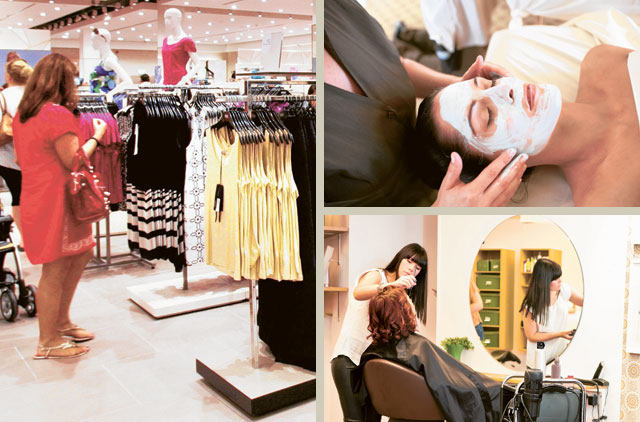
Dubai: For Indian housewife Shweta, life in Dubai is one long party. Married to a wealthy businessman, the 49-year-old keeps a busy diary, attending kitty parties and other social dos. She spoils herself silly at the beauty salon and spa and is invariably dressed to the nines — be it the expensive jewellery she dons or the latest designer wear she endorses.
Diana, another Dubai resident, 34, also aspires to the high life. She is single and working and has only that much money at her disposal. But she spends all of it on eating out, clubbing, personal grooming and clothes and accessories, besides rent. She often runs out of cash, but uses her credit card freely.
Welcome to Dubai where residents, particularly women, spend big.
Studies have established that the UAE has the region's highest individual spenders, with each of its 8.2 million people spending an average of $21,577 (Dh79,252) per annum (Arab Monetary Fund, 2010) and the world's highest apparel sales per capita at $785 (Dh2,865, A.T. Kearney's Global Retail Development Index, 2010). At $71 (Dh260) a week, UAE teenagers also spend three times more than their global peers (AMRB).
But what is the share of the fairer sex in this whopping expenditure? Do women in Dubai spend too much? And can they help it?
According to a report by Euromonitor International, UAE women have more disposable income than their counterparts in other GCC countries. Before 2010, they had an annual discretionary income of Dh9,000. By 2014, this is expected to go up to Dh11,000.
As the extra cash flows in, women find it hard to tighten their purse strings.
"People come to Dubai and suddenly have significantly higher incomes than they have had in the past due to the increase in salary and generally tax-free income (for most expats, not including US taxpayers)," said Vince Troung, Certified Financial Planner at Holborn Assets.
"The good times are rolling and they assume they will last indefinitely. They tend to have a short-term memory when it comes to personal finance. Combine this boost in income with a little bit of boredom and the temptations for spending that the city offers, and you have a recipe for overspending."
He said overspending is more prevalent in Dubai than in many other cities. "You could be in New York, London or Los Angeles, making good money, but you'd still be aware that you have taxes to pay and the economy is struggling. In Dubai, you live in something of a bubble and so long as there's a job with good income, you're not feeling the heat of what's happening in the rest of the global economy. Women in Dubai can be more sheltered from reality and more at risk to anything that threatens their current lifestyle.
"If I were to make a broad-based generalisation, the people splurging the most are wives who don't work, whose husbands earn in excess of Dh1 million (per annum) and who are probably in their late 30s to early 50s."
The mindset of an expat shopper also plays its part.
As Janelle Malone, Dubai-based wealth commentator and author of the blog Women, Money & Style, said: "We live as expats away from our home country. So there is a tendency to live the ‘holiday lifestyle' even if we reside here for many years."
Malone, who spent 14 years analysing the spending habits of shoppers and designing retail space to maximise sales, said, "Dubai is home to one of the most productive malls per square metre in the world as well as a whole host of other retail and entertainment offerings. So it's likely that our spending could be more than we think."
Peer pressure
She said there is a huge pressure on the average Dubai woman to ‘keep up with the Joneses'. "One of the most accurate descriptions of the expat female population I have heard since being in Dubai is lots of people spending money they don't have trying to impress people they don't know," she said, adding that Dubai women should learn to save money in keeping with the ‘she-conomy' that is set to fuel the next financial decade.
Much of the money that women currently spend goes into self-indulgence. Katrina Yakusheva, Fashion Marketing Consultant and Founder of Dubai's Fashion Business Club Intl, said, "When it comes to spending habits of women in Dubai, I'd describe it with one word - luxury. Compared to other cities in the world, women here have got more opportunities for luxury shopping due to the lifestyle in Dubai."
Some women in Dubai spend between Dh3,000 and Dh7,000 on themselves every month - mainly on salons, spas and clothes and accessories shopping, she said.
"I believe the Dubai lifestyle requires women to look their best all the time, therefore, their appearance is quite important. It does not only involve personal fashion style, but also procedures such as anti-ageing treatments, personal nutrition, fitness, etc." Yakusheva said women in their 20s spend on salons, clothes and accessories, while those 30 and above spend on health and beauty, fashion items such as luxury accessories, fine jewellery and high-end designer evening wear. "Most are housewives and high-ranking executives," she said, adding Arab and Asian women tend to spend more compared to European/Western women when it comes to luxury items.
Malone said the working woman grabs what she needs because she is short of time. But the non-working woman has her own compulsions. "For example, a new mum who is pushing her baby in a pram is at risk of walking around the mall to amuse the child, not realising she has picked up a flip-flop in the colour of the season, a T-shirt, some toys for the baby and a couple of coffees along the way." But clearly such passive spending has its dangers.
Troung said, "In most countries, ‘debtor's prison' is just an expression. Here, it is a literal reality. So if you spend more than what you bring in or incur outsized debt, you're exposing yourself [or your spouse] to serious consequences. Many women are also at risk if something happens to their husband or they're divorced, and they haven't had a job in many years. They may no longer have the job skills to make themselves marketable. They are also at risk if they spend money freely without ever learning how to budget, save and invest."
Yakusheva said spending sprees can turn dangerous if they become ‘retail therapy'. "This is actually a psychological disorder and can be quite damaging, resulting in financial debt or divorce in some cases." Women also lay themselves open to health risks by subjecting themselves to painful cosmetic procedures on which they do not hesitate to spend, she added.









